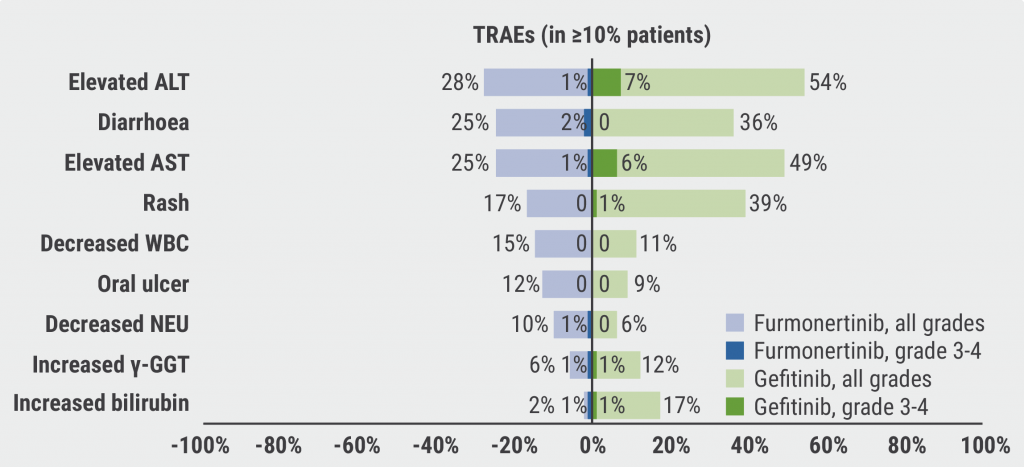https://doi.org/10.55788/6731aaae
Furmonertinib is an irreversible, selective, third-generation EGFR tyrosine kinase inhibitor. The phase 3, randomised, double-blind FURLONG study (NCT03787992) aimed to compare the efficacy and safety of furmonertinib versus gefitinib in untreated, advanced NSCLC patients with EGFR-sensitizing mutations.
The trial enrolled 358 patients with treatment-naïve, stage IIIB–IV NSCLC whose tumours were EGFR mutation-positive. Patients were randomised 1:1 to receive furmonertinib 80 mg/day or gefitinib 250 mg/day first-line treatment. In the furmonertinib and gefitinib arms, 35% and 32% had CNS metastases at baseline, respectively. The primary endpoint was PFS. Secondary endpoints included objective response rate (ORR), duration of response, and overall survival (OS). Dr Yuankai Shi (National Cancer Center, China) presented the first results of the FURLONG study [1].
The median follow-up was 21.0 months in each arm, and median duration of exposure was 18.3 months in the furmonertinib arm versus 11.2 months in the gefitinib arm. The median PFS in the furmonertinib arm was significantly longer than in the gefitinib arm (20.8 vs 11.1 months; HR 0.44; P<0.0001). The PFS benefit was consistent across all pre-specified subgroups, including patients with CNS metastases (HR 0.50; P=0.0028). ORR was 89% versus 84%, respectively, in the furmonertinib and gefitinib arm, and median duration of response was 19.7 versus 10.5 months (OR 0.9; P<0.0001), respectively. OS data were not yet mature.
The frequency of grade ≥3 treatment-related adverse events was 11% in the furmonertinib group versus 18% in the gefitinib group. The most frequent treatment-related events in both treatment arms were diarrhoea, rash, and elevated ALT/AST (see Figure).
Figure: Most frequent treatment-related adverse events in FURLONG [1]

Overall, furmonertinib significantly prolonged PFS in patients with treatment-naïve, EGFR-mutated, stage IIIB-IV NSCLC compared with gefitinib. Despite a longer duration of exposure, furmonertinib showed less grade ≥3 treatment-related adverse events compared with gefitinib. Therefore, these results suggest furmonertinib to be a potential first-line therapy in patients with advanced/metastatic NSCLC.
- Shi Y-K, et al. Furmonertinib versus gefitinib in treatment-naïve EGFR mutated non-small cell lung cancer: A randomized, doubleblind, multi-center, phase III study (FURLONG). Abstract 1O. ELCC 2022 Virtual Meeting, 30 March–02 April.
Copyright ©2022 Medicom Medical Publishers
Posted on
Previous Article
« Second-line oritinib demonstrated potential clinical benefit in advanced EGFR-mutated NSCLC Next Article
Pro-inflammatory tumour profile predicts complete pathological response to neoadjuvant chemoimmunotherapy »
« Second-line oritinib demonstrated potential clinical benefit in advanced EGFR-mutated NSCLC Next Article
Pro-inflammatory tumour profile predicts complete pathological response to neoadjuvant chemoimmunotherapy »
Table of Contents: ELCC 2022
Featured articles
Early-Stage Non-Small Cell Lung Cancer
Real-world treatment and survival in early-stage NSCLC
Consistent efficacy of osimertinib in Chinese and global population
Promising efficacy of neoadjuvant osimertinib in EGFR-mutated NSCLC
Peri-operative survival in bilobectomy is comparable with that of left pneumonectomy
Advanced Non-Small Cell Lung Cancer
Pro-inflammatory tumour profile predicts complete pathological response to neoadjuvant chemoimmunotherapy
Furmonertinib outperforms gefitinib as first-line therapy in patients with EGFR-mutated NSCLC
Second-line oritinib demonstrated potential clinical benefit in advanced EGFR-mutated NSCLC
Updated results confirm efficacy and safety of entrectinib in patients with NTRK fusion-positive NSCLC
ROS1 rearrangement-targeting unecritinib is a potential new first-line strategy
Savolitinib is effective in patients with MET-mutated NSCLC
Sintilimab plus chemotherapy improves OS in treatment-naïve, stage III–IV non-squamous NSCLC
Updated results of CameL-sq trial confirm benefit of camrelizumab
No long-term benefit of adding ipilimumab to pembrolizumab in metastatic NSCLC
In concurrent CRT for stage III, unresectable NSCLC, performance status is better with proton therapy than photon therapy
No improved prognosis for concurrent versus sequential immune checkpoint inhibition and CRT in unresectable NSCLC
Durvalumab after sequential CRT safe in stage III, unresectable NSCLC
No impact of grade ≥2 pneumonitis on patient-reported outcomes in PACIFIC
Immunotherapy delays deterioration in health-related quality of life in metastatic NSCLC
Small Cell Lung Cancer
Total metabolic tumour volume: a new potential prognostic factor in SCLC
Radiation dose on oesophagus predicts OS in SCLC patients treated with chemoradiotherapy
Characteristics of long-term survivors in the CASPIAN trial
Outcomes of real-world CANTABRICO trial match results from CASPIAN
Lung Cancer Epidemiology
Lung cancer diagnosis with liquid biopsy of peripheral blood cells
Rare EGFR mutations as oncogenic drivers
Decline in lung cancer mortality is almost exclusive to men
Related Articles
September 21, 2021
Real-world data shows inferior survival compared with IMpower150 results
September 8, 2020
Higher thrombotic risk in NSCLC patient with ALK rearrangement
© 2024 Medicom Medical Publishers. All rights reserved. Terms and Conditions | Privacy Policy

